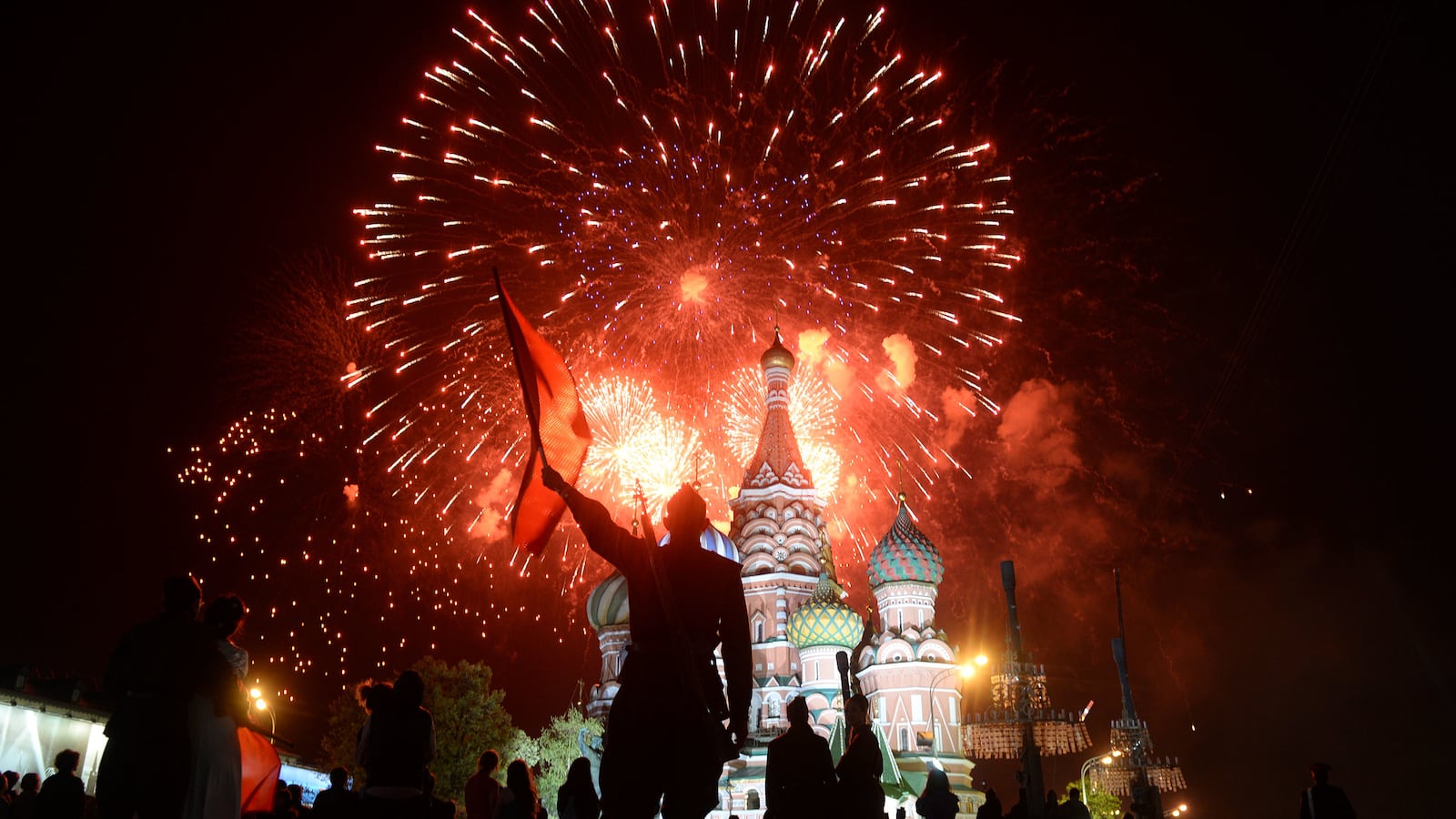MOSCOW—Vladimir Putin must have been pleased with Saturday’s Victory Day celebrations. He has turned the 70th anniversary of the day Nazi Germany capitulated into Russia’s most triumphant military parade in history, with demonstration of nuclear weapons in the streets of Moscow.
It was a chance for people to, once again, show unity and patriotism. And if few Western leaders accepted Putin’s invitation to the parade on Red Square, so what? He might say it’s just another sign that everybody is against Russia.
At any rate, the Russian president did not admit the absences upset him. “Everybody we wanted to see were here,” he told Russia-1 television channel.
That would include German chancellor Angela Merkel, Russia’s most important guest, who arrived in Moscow on Sunday, the day after the official celebration. Merkel laid flowers on a World War II monument and had a quiet dinner with Putin.
Did Putin complain to Merkel over dinner about Obama and other world leaders not paying enough respect to his country, which lost around 20 million people, both civilians and military, during the war?
“He might,” the Moscow based Kremlinologist Stanislav Belkovsky told The Daily Beast. “But being psychologically a very complex person, Putin will never admit to Merkel that it was his fault that most of his invitations to Moscow had been ignored—which to me was just awful.”
During his 15-year rule, Putin has turned May 9 into Russia’s most important state holiday, and this year’s marks the most militarized and politicized it’s every been. The Kremlin’s English language television channel, Russia Today, bragged about nuclear bombers and tactical surface-to-air missile systems on the square. The show was meant to wow the populace and the world, and it mostly succeeded. Many viewers who saw fighter-bombers forming the number “70” in the sky said they were impressed.
But not everyone was so thrilled at the display of military might. “I am not sure I want to see nuclear weapons or any weapons at all in the center of Moscow,” said Svetalana Nikolskaya, a math teacher said. “I miss Yeltsin’s parades, when military machines did not participate in the parade.”
President Boris Yeltsin had banned heavy military machines from Red Square, but Putin brought them back. At first, it was tanks and airplanes, but then more serious weapons began to creep onto the main squares of Russian cities. In Chita, locals took videos of a Buk anti-aircraft system catching fire during Victory Day parade on Saturday.
Last July, the Buk system became infamous when one was used to shoot down Malaysia Airlines MH17 over eastern Ukraine, killing all 283 passengers and crew aboard. That did not stop the Kremlin from bringing a few Buks to Red Square on Saturday, though.
Moscow also demonstrated serious weapons of mass destruction. Mobile short-range and long-range ballistic missile systems rolled gingerly through Moscow’s central streets full of families having meals on verandas. And the newest universal multiple rocket launchers and tanks rolled across main squares not only in Moscow, but also in over a dozen Russian cities.
“Unlike Germany, which accepted their historical guilt and grew to be the most economically developed country, Russia never apprehended the horror of millions of Soviet citizens executed by KGB and just continued to destroy its industry and economy,” Belkovsky said. “Demonstration of weapons, that altogether could be weaker than a few U.S. aircraft carriers, is a show, like a thick golden chain on a neck of a crook.”
If today was about history, it should be noted that Russia’s history of the war is not the same as taught in Western Europe. An ordinary Russian student does not know that the war began in 1939, when Germany invaded Poland and not two years later when Hitler attacked the Soviet Union on June 22.
They don’t know that the Soviet NKVD (Narodnyy Komissariat Vnutrennikh Del or People’s Commissariat for Internal Affairs, a precursor to the KGB) massacred hundreds of people in Western Ukraine, or that the Soviet Union itself invaded Poland 16 days after Nazi Germany did. Nobody in the Kremlin explained to Russians the real reasons why world leaders ignored Moscow’s Victory Parade in 2015—that Putin’s actions in Ukraine and Crimea had made him the least popular guy in the world leaders’ club.
“Obama’s administration put severe pressure on a number of countries, so their leaders would refuse to go to Moscow,” Aleksei Pushkov, the head of the foreign-affairs committee in the State Duma, posted on Twitter earlier this weekend by way of explanation.
Despite Russia’s diplomatic isolation and military muscle flexing, traditions persisted. As always, across the country, the morning of May 9 started with military parade in town squares from St. Petersberg to Vladivostok. Youths gave flowers to war veterans, families took long strolls, listened to the music of life and enjoyed evening fireworks. Veterans, their chests bedecked with colorful medals, had privileged seats at the parades. Officials and veterans waved to soldiers marching on the cobblestones of Red Square, and colorful fireworks lit up the sky in the evening.
At the end of the day, most Russians did not care for geopolitics, however, and instead genuinely remembered beloved ones. Both my grandfathers went to war, as volunteers, in June 1941. They both returned, their chests covered in medals—and my mother’s father without a leg. My grandmother’s twin brother, Yuriy, was killed in 1942. He stepped on a land mine.
Over one million Russians walked on Saturday with portraits of their family members who were veterans of WWII. Even Putin walked with crowds in the so-called Immortal Regiment, carrying a portrait of his father, a soldier in the Red Army, and also named Vladimir Putin.






